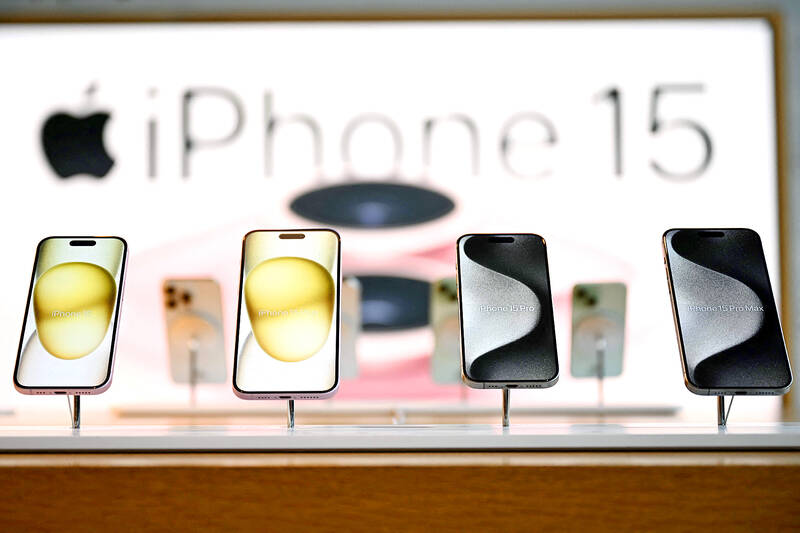Alphabet Inc’s Google Pixel is eroding the iPhone’s dominance in Japan as the Apple Inc device gets pricier, finding success after years of misfires.
Google phones accounted for a record 12 percent share in the Asian country in the June quarter, six times what it was a year ago, according to Counterpoint Research data. During the same period, the iPhone’s market share slumped by almost as much: to 46 percent from 58 percent a year earlier.
Japan is a key arena for the two Silicon Valley firms, as the world’s third-biggest economy and a huge market for mobile software and games. The iPhone has been as dominant there as at home in the US, and its decline this summer was the first time it commanded less than half the Japanese market in two years.

Photo: AFP
The plunging value of the yen pushed Apple to raise iPhone prices in Japan earlier than its recent global price hikes, and the cost of the device is proving a noticeable deterrent, at a time when the latest handsets have not offered must-have new features.
“Japanese users are becoming more pragmatic,” Counterpoint analyst Tom Kang said in an interview in Seoul. “There’s now more opportunity for alternatives. We’ve seen a little bit of growth in Sony and a little bit of growth in some other brands, but the growth of Google was most surprising.”
The yen’s weakness has also helped juice the Pixel’s sales. It makes the phone a bargain for consumers outside of Japan who want to buy the phone. The Pixel is offered in a limited number of countries and the yen’s slide toward its lowest level in more than three decades has made Japan the cheapest place to purchase the device.
“Japan is becoming the trans-shipment hub for Google Pixel devices,” Kang said. “So the iPhone is suffering from a weak yen and Google is benefiting from it.”
The sales drop in Japan highlights the challenges ahead for Apple. The company posted its third straight quarter of declining sales and predicted a similar performance in the current period, hurt by an industry-wide slump that has sapped demand for phones.
The release of Apple’s latest iPhone 15 series might give its market share a bump, although the starting price of the iPhone 15 Pro Max was raised by US$100 this year after eliminating a smaller storage tier offered in past years. Google is set to launch its latest Pixel device generation at an event on Wednesday next week.
“Price is becoming an important factor,” Kang said. “Loyalty for Apple and iOS is much higher than Android, I’d say. But Android devices always have the price advantage.”

Merida Industry Co (美利達) has seen signs of recovery in the US and European markets this year, as customers are gradually depleting their inventories, the bicycle maker told shareholders yesterday. Given robust growth in new orders at its Taiwanese factory, coupled with its subsidiaries’ improving performance, Merida said it remains confident about the bicycle market’s prospects and expects steady growth in its core business this year. CAUTION ON CHINA However, the company must handle the Chinese market with great caution, as sales of road bikes there have declined significantly, affecting its revenue and profitability, Merida said in a statement, adding that it would

Greek tourism student Katerina quit within a month of starting work at a five-star hotel in Halkidiki, one of the country’s top destinations, because she said conditions were so dire. Beyond the bad pay, the 22-year-old said that her working and living conditions were “miserable and unacceptable.” Millions holiday in Greece every year, but its vital tourism industry is finding it harder and harder to recruit Greeks to look after them. “I was asked to work in any department of the hotel where there was a need, from service to cleaning,” said Katerina, a tourism and marketing student, who would

i Gasoline and diesel prices at fuel stations are this week to rise NT$0.1 per liter, as tensions in the Middle East pushed crude oil prices higher last week, CPC Corp, Taiwan (台灣中油) and Formosa Petrochemical Corp (台塑石化) said yesterday. International crude oil prices last week rose for the third consecutive week due to an escalating conflict between Israel and Iran, as the market is concerned that the situation in the Middle East might affect crude oil supply, CPC and Formosa said in separate statements. Front-month Brent crude oil futures — the international oil benchmark — rose 3.75 percent to settle at US$77.01

RISING: Strong exports, and life insurance companies’ efforts to manage currency risks indicates the NT dollar would eventually pass the 29 level, an expert said The New Taiwan dollar yesterday rallied to its strongest in three years amid inflows to the nation’s stock market and broad-based weakness in the US dollar. Exporter sales of the US currency and a repatriation of funds from local asset managers also played a role, said two traders, who asked not to be identified as they were not authorized to speak publicly. State-owned banks were seen buying the greenback yesterday, but only at a moderate scale, the traders said. The local currency gained 0.77 percent, outperforming almost all of its Asian peers, to close at NT$29.165 per US dollar in Taipei trading yesterday. The